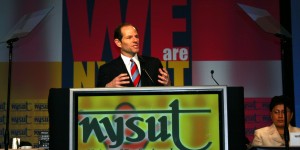July 8, 2010 Near midnight last Thursday, House Speaker Nancy Pelosi and her fellow forced unionism apologists in the U.S. House of Representatives disgracefully amended a “must-pass” war funding bill to include language that is designed to force police officers, firefighters, and Emergency Medical Technicians (EMTs) into “exclusive” union bargaining in every state in the country.
It doesn’t take a rocket scientist to figure out that policies expanding public sector monopoly unionism have played a major role in driving many states to the verge of insolvency.
In 2009, according to respected labor economists Barry Hirsch and David Macpherson, 41 percent of government employees nationwide were subject to a contract negotiated by a union monopoly-bargaining agent.
However, in the 22 states which prohibit forced union dues for government employees and most of which don’t authorize public-sector union monopoly bargaining, fewer than 30 percent of public workers are unionized. Not one of these 22 states was to be found on last month’s Business Insider’s list of the states “most likely to default.”
Business Insider ranked heavily unionized California, Illinois, Massachusetts, Michigan, Nevada, New York, New Jersey, Ohio and Wisconsin as the worst default risks. And the Hirsch-Macpherson data shows that an average of 61 percent of public-sector employees in these nine states were under union monopoly bargaining — 20 percent higher than the typical state.
In these nine worst default-risk states from 1999 to 2009, aggregate private-sector jobs fell by 4.2 percent, but heavily unionized state and local government jobs increased by 9 percent. Since annual state and local government employee compensation costs nationwide come to $1.1 trillion, or half of all state and local government spending, it’s not hard to see that the Big Labor-driven growth in government payrolls is a fiscal catastrophe for states like California, Illinois, and New Jersey.
Yet to Gerald McEntee, president of the American Federation of State, County and Municipal Employees (AFSCME) union, even calling attention to the fact that government payrolls for years have grown while private payrolls have shriveled is tantamount to an “assault on public employees.”
In a Huffington Post commentary bearing that heading, McEntee thundered that the only acceptable solution to the daunting fiscal problems faced by states like California, Illinois, and New Jersey is for elected officials to squeeze even more taxes out of beleaguered private-sector employees and businesses.
But for all his bluster, he can’t keep New Yorkers, for example, from noticing that while the number of Empire State pupils enrolled in K-12 public schools fell by more than 121,000 over the last 10 years, schools added 14,746 teachers and 8,655 non-teaching professionals to their payrolls, all of whom are required to pay union dues or fees to keep their jobs.
But government union bosses are expecting to have the last laugh if fed-up taxpayers and their allies limit themselves to going after just bloated public-sector payrolls and unsustainable public pension plans, rather than root of the problem itself.
Laws empowering government union officials to negotiate the contract terms for all front-line employees at a public agency, even for those employees who want nothing to do with the union, are behind the messes in Sacramento, Springfield and Trenton. And laws that authorize the firing of public servants for refusing to pay union dues or fees to an unwanted union make matters even worse.
Long-term solutions to state budget crises will require addressing the core problems of union monopoly bargaining and forced union dues in the public sector.
Until then, hopefully the Senate will spare police officers, firefighters, and EMTs from forced union “representation” that will make budget matters worse for the numerous states that have already rejected it.
Mark Mix is president of the National Right to Work Committee.


